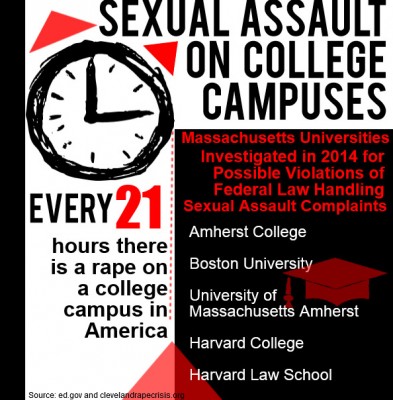
Boston University administrators opted out of an anonymous national sexual assault survey administered by the Association of American Universities and have said they have plans to conduct their own survey in the future.
The Daily Free Press reported May 1, 2014 that BU is one of 55 colleges under investigation by the U.S. Department of Education for allegedly mishandling sexual harassment and violence complaints on campus and violating Title IX legislation, which prohibits gender discrimination at institutions that receive federal financial aid.
The AAU’s sexual assault survey will have a large sample of students from a variety different kinds of campuses across the nation, said AAU spokesman Barry Toiv. Results from the climate survey could be applicable to the universities participating.
“We think that the results will be extremely useful generally,” he said. “Each university will receive its own data, so it also serves the purpose of providing universities with their own information.”
Dean of Students Kenneth Elmore said BU declined to participate in the survey because it will be conducting its own sexual assault climate survey.
“We want to have a survey that’s a little more tailored to our population, what we’re looking for and we also had some questions about the survey that AAU is conducting and the timing,” he said. “It didn’t quite fit into our cycles here, so that was important for us.”
Of the 62 schools in the association, 26 of the research institutions, including BU, chose not to participate in the AAU survey, Inside Higher Ed reported Jan. 13.
The AAU does not criticize any of the schools that opted out of the survey, Toiv said.
“Most of those that decided not to participate gave as their primary reason the fact that either they individually, or their state university systems, were conducting their own surveys,” he said. “Our individual universities have decided whether it is necessary for them to participate.”
While BU will be implementing its own survey in the coming months, Elmore said he recognizes how the AAU survey could be beneficial for data comparison, especially for schools within the same area.
“There may be some elements of attitudes and behavior and conduct that have more of a citywide implication than we think, so in an ideal world, we would have a similar survey as our other urban Boston area colleges and universities had, and that way we could share data and really get a good sense, but that’s just not where anyone is right now,” he said.
BU spokesman Colin Riley said in addition to creating its own survey on sexual assault, the university has taken other efforts to educate and aid students.
“In the past few years, BU has established a Sexual Assault Response and Prevention Center and implemented bystander intervention training and expanded its educational programs as part of a comprehensive approach to increasing awareness of the issue and the steps to take and resources available if one is the victim/survivor of sexual assault,” he said in an email
Several students shared mixed feelings about BU’s decision not to participate in the survey, but they are glad that the university is taking steps to understand and assess sexual assault.
Jake Zingerman, a freshman in the College of General Studies, said that participating in the survey would be beneficial to the AAU’s universities, BU included.
“Honestly, they should have just done it because then they would have a better understanding of what’s going on everywhere,” he said. “A way to prevent sexual assault is first to inform everyone about it.
Darnell Reese, a freshman in CGS, said having data from a campus-specific survey and a national one could be helpful in understanding problems with sexual assault and how to address them.
“Doing this program with other universities, they can understand what other universities are going through,” he said. “It works both ways because working as a group, you can understand what’s happening across the country, but in other ways, having a campus-specific survey is good too.”
Eva Kennedy, a sophomore in the School of Education, said she would have liked to see BU participate in the AAU survey because the university is still part of the nationwide discussion about sexual assault on college campuses.
“Every college is so different that to give a picture of what our whole nation is. It’s important to have data from different colleges, like big versus small, city versus suburban,” she said. “I feel like maybe they’re [BU] trying hard to educate a certain community or some people, but I don’t think they really have it [sexual assault education] for everyone.”
Mina Corpuz contributed to the reporting of this article.























































































































